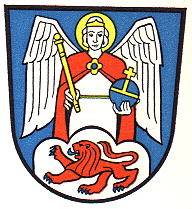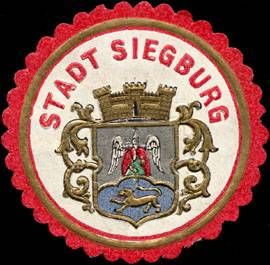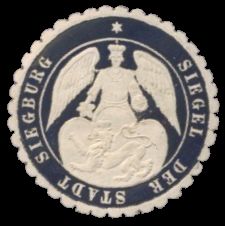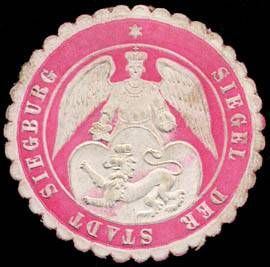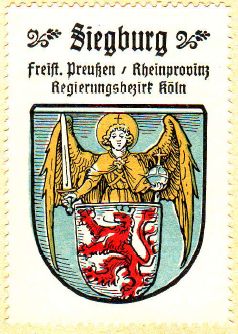Siegburg: Difference between revisions
Knorrepoes (talk | contribs) m (Text replace - "|width="15%"|50 px|right |}" to "|width="15%"|50 px|right |}<seo title="Wappen, Gemeindewappen" />") |
Knorrepoes (talk | contribs) |
||
| Line 23: | Line 23: | ||
{|align="center" | {|align="center" | ||
|align="center"|[[File:siegburgz1.jpg|center]] <br/>Seals of the city from around 1900. | |align="center"|[[File:siegburgz1.jpg|center]] <br/> | ||
|align="center"|[[File: | |align="center"|[[File:siegburgz2.jpg|center]] <br/>Seals of the city from around 1900. | ||
|align="center"|[[File:siegburgz3.jpg|center]] <br/> | |||
|- | |- | ||
|align="center"|[[File:siegburg.hagd.jpg|center]] <br/>The arms in the [[Kaffee Hag albums]] +/- 1925 | |align="center"|[[File:siegburg.hagd.jpg|center]] <br/>The arms in the [[Kaffee Hag albums]] +/- 1925 | ||
Revision as of 07:00, 25 May 2014
| Heraldry of the World Civic heraldry of Germany - Deutsche Wappen (Gemeindewappen/Kreiswappen) |
SIEGBURG
State : Nordrhein-Westfalen
District (Kreis) : Rhein-Sieg Kreis
Additions : 1899 Wolsdorf
Origin/meaning
The arms were granted in 1947.
The city received city rights in the early 13th century. The oldest seals show until 1430 a walled city. Later St. Anno, the patron saint appears on the seals. All later great seals show either a city or the saint.
Smaller seals (ad causas) show St. Michael, the patron saint of the mighty abbey of Siegburg, behind the arms of the Counts of Berg, a lion. Since 1558 the small shield was replaced by a mountain and a (free)lion. This seal was used for the present arms, which were granted in new and more defined colours in 1947.Hupp showed the arms in the 1920s in a different composition, with the lion in a shield, see below.
| |
Seals of the city from around 1900. |
|
| The arms in the Kaffee Hag albums +/- 1925 |
Literature : Stadler, 1964-1971, 8 volumes; Hupp, O: Kaffee Hag albums, 1920s

